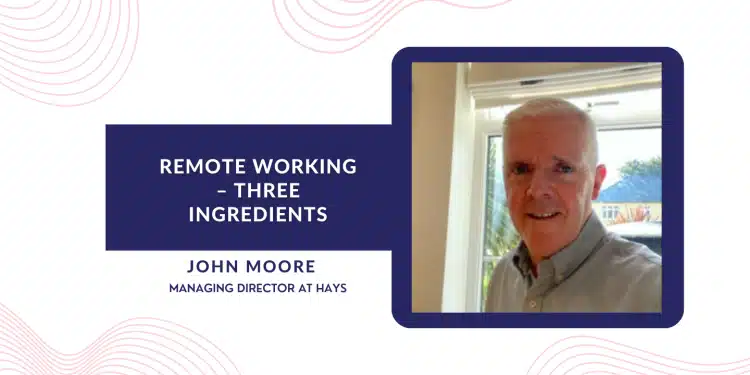Setting up and running an effective remote team does not just happen. Simply recruiting people or saying to an existing team: ‘We are now going to work as a remote team’ does not and will not work.
We believe there are three components that support effective remote team-working:
- THE TEAM
- THE TOOLS you use
- THE PROCESSES you implement
The Team
It almost goes without saying, the team itself is the most vital component. Remember, not everyone is suited to working in a remote environment, and not everyone can manage a remote environment. Therefore, assembling and training a team that can work effectively in a remote environment is key. Here are some tips to consider when building your remote team:
Recruit Doers
Doers achieve – they get things done and overcome obstacles and challenges. Yes, they need to be given direction and managed, but doers get things done.
Only take on people you trust
Trust is key. Without trust, you will be tempted to micromanage, over-communicate and waste time worrying if they are working and performing.
Trust each other
It is a two-way thing – if you do not trust team members, they will not trust you. Learn to set and manage expectations and performance but give people the time and space to take ownership and responsibility for their own work and performance.
Recruit people who communicate
Unlike a physical working environment where information can be shared in person, remote team members rely more on other forms of communication – e-mails, forums and chat rooms, reports and management information reports. Communication skills need to be fine-tuned and adapted to remote working.
Take on people who do not need a physical working environment
It’ll be important to try to create some social aspects with a remote team. But, the truth of the matter is that remote workplaces are usually less social than co-located ones. People on remote teams need to be ok with that. The best remote workers will thrive in this type of environment.
Read More on Why team building matters.
The Tools
Do not underestimate the importance of digital tools when working with remote teams: tools help you organise, plan, communicate and manage the performance of remote teams.
It is relatively easy to call a meeting in a physical working environment and share ideas and communicate. In a remote team, managers must create the same opportunities – selecting and using the right tools will enable the team to work together, collaborate and be engaged.
There are many tools that can help with this – here are just a few of the most popular ones
Slack can help to create a virtual office. It can create a single place for messaging, tools, and files, thereby helping everyone save time and collaborate.
Trello uses boards, lists, and cards enable you to organise and prioritise team projects in a flexible, easy-to-use way.
Google Docs enables teams to share documents and spreadsheets. Google Docs is an easy, shared environment that almost anyone can use with little or no time required to learn how to use it.
Tool #4: GoToMeeting
There are many video conferencing tools like GoToMeeting, ezTalks Meetings, Skype and Zoom. A reliable video meeting system is a MUST tool for remote teams.
Freedcamp is a web-based project management tool and organisation system for single or multiple users collaborating using cloud computing.
The Processes
The third component that impacts team effectiveness processes. All teams, especially remote teams, need to have structure, direction, agreed protocols for communicating, collaborating and getting things done. Here are some important processes to consider:
Everyone should provide support
The customer is our lifeblood; therefore, team members should think of each other as customers. When everyone on the team provides support, everyone gets help, gives help and is engaged.
Regular Hangouts
Hangouts are essential and provide team members with the opportunity to connect, share, collaborate and learn something new. Maintain the discipline of having the meeting simultaneously even if there is relatively little to share and to discuss – make it a remote team habit.
Monthly One-to-Ones
Most team members will confirm that they do not get enough feedback. A good practice is to set up a recurring monthly one-to-one with each team member and discuss four things:
- What is one thing you are excited about right now?
- What is one thing you are worried about right now?
- What is one thing I (the team manager) can do better to help you with your job?
- What is one thing you could do better to improve your performance?
Asking these four questions consistently makes it easy for both the team member and team manager to prepare for the one-to-one meeting – they also make it easy to measure changes and improvements over time. By asking each question to one issue makes the actions achievable for the team member and manager. Over time, being able to fix one issue a month adds up.
The answers to each monthly session should be logged, possibly using a Google Document. The next one-to-one session can be discussed and reviewed, therefore building and focusing on achievements and successes.
A culture of accountability
One question often asked about remote teams is ‘how do you know if people are doing work?’ A straightforward way to find out other than asking them directly is to have team members post a weekly update on a shared team platform such as Freedcamp. This activity ensures the team can see up-dates, and it encourages a culture of accountability.
Meeting in person
Face-to-face interaction is valuable for any team, therefore aim to bring the team together two times a year – ideally somewhere cool. In addition to other ‘all-company get togethers’, small groups could also get together on an ad hoc basis throughout the year to coordinate the start and development of a major project or activity. Although this comes at a cost, remember you are no longer paying for a central office that everyone is working in.
Automate anything that can be automated
The core for most effective remote teams is automation. There are several reasons for automating:
- It helps to keep the team size small since you do not need people to perform repetitious, mundane and boring tasks
- It enables teammates to focus on high impact work for most of their time which is usually more interesting and stimulating.
Over the last two decades, Exponential Training mission is to improve the performance of Managers, Coaches and Consultants through the delivery of flexible and affordable professional development. If you are interested in becoming an excellent manager, please contact us.




